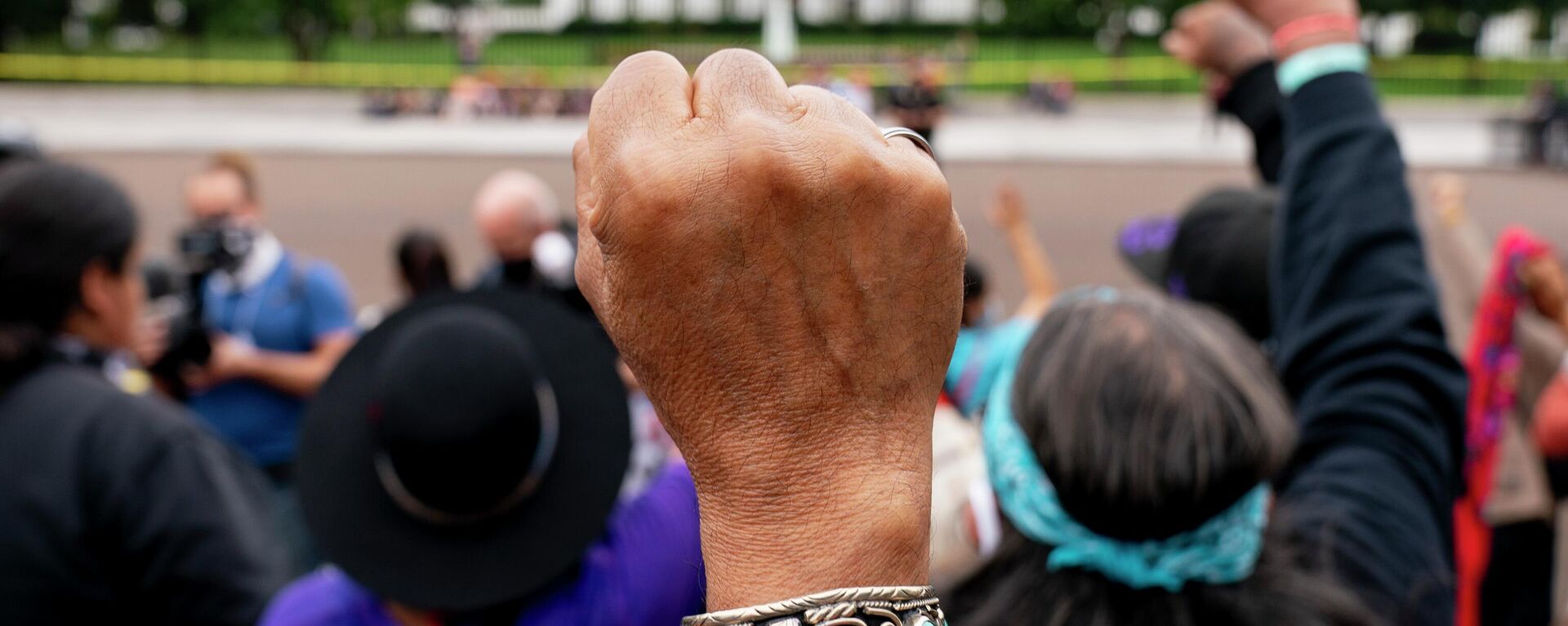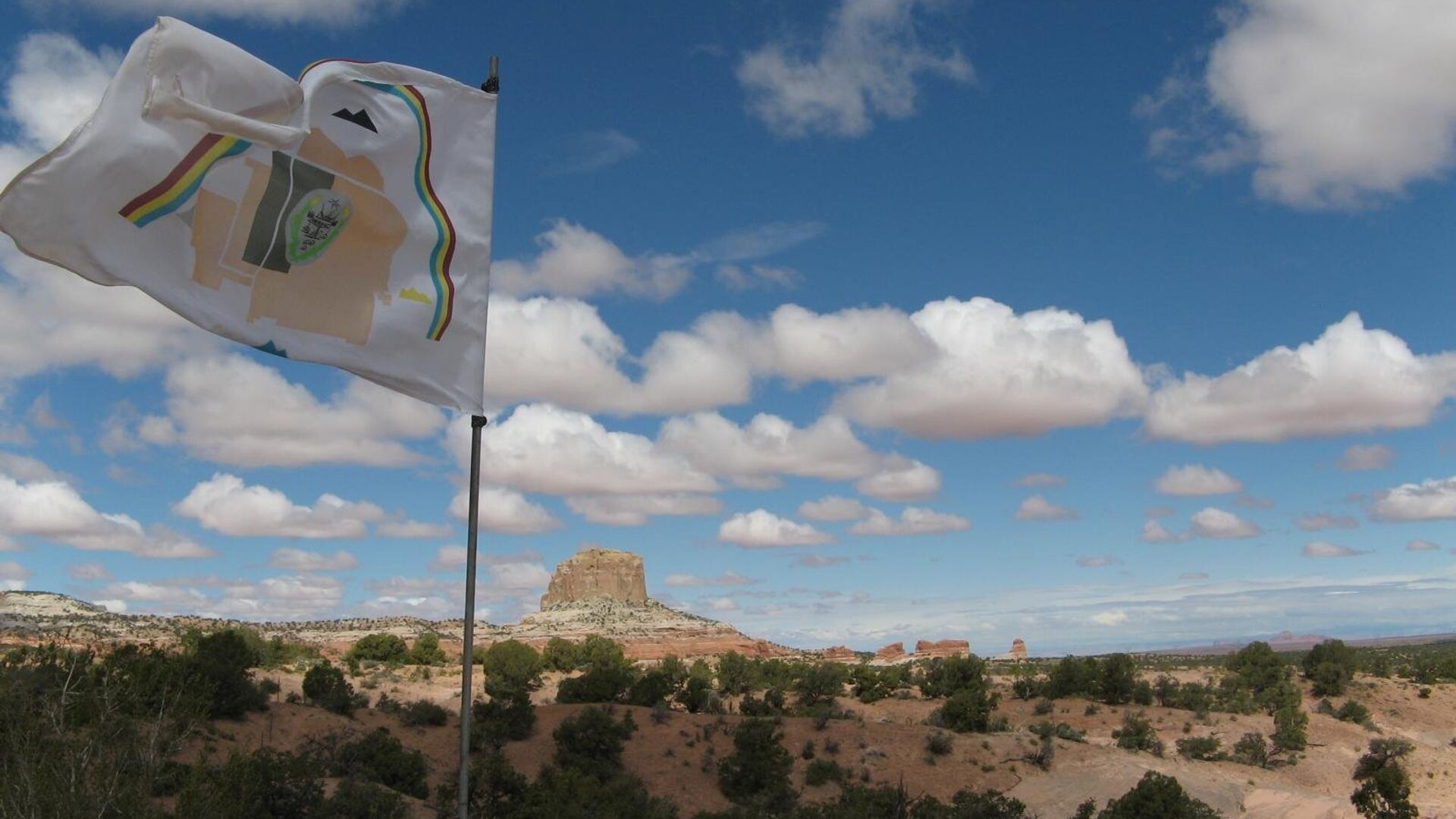https://sputnikglobe.com/20231222/deeply-troubling-us-pledges-billions-of-dollars-for-foreign-nations---navajo-tribe--1115739583.html
'Deeply Troubling' US Pledges Billions of Dollars for Foreign Nations - Navajo Tribe
'Deeply Troubling' US Pledges Billions of Dollars for Foreign Nations - Navajo Tribe
Sputnik International
It is troubling that the United States pledges billions of dollars to assist foreign nations when hundreds of US Native American tribes only receive a small fraction of that support, Navajo Nation Washington Office Executive Director Justin Ahasteen told Sputnik.
2023-12-22T06:15+0000
2023-12-22T06:15+0000
2023-12-22T06:15+0000
americas
us
joe biden
navajo nation
washington
white house
congress
https://cdn1.img.sputnikglobe.com/img/102028/43/1020284330_0:151:1600:1051_1920x0_80_0_0_226549a7cea91af501883ce9ace56179.jpg
US Senate and White House negotiators are currently negotiating President Joe Biden's $106 billion nationals security supplemental bill that includes more than $60 billion for Ukraine. Republicans want the legislation to include stronger changes on border security policy before supporting it. The Navajo tribe believes that a more domestic-focused approach is needed from the US government, Ahasteen said. US tribes face pressing domestic issues, from health disparities to cultural preservation, and from economic development to the protection of our homelands, according to Ahasteen. The Navajo tribe, Ahasteen said, hopes the Biden administration, and future administrations, will strengthen relations with Native American tribes through sustained, meaningful action.President Joe Biden has ignored repeated requests from the Navajo Tribe in the last two years to appoint a commissioner to oversee the Office of Navajo Hopi Indian Relocation, Navajo Nation said.According to the US Federal Register, the Office of Navajo and Hopi Indian Relocation (ONHIR) is an independent agency responsible for assisting Hopi and Navajo Indians impacted by the relocation that Congress mandated in 1974 for members of the tribes who were living on each other's land.Biden has the power to make the appointment of a commissioner to oversee the ONHIR without Senate confirmation, but has refused to do so with no explanation, Ahasteen added.The US Federal Register explains that the relocation imposed by the Navajo-Hopi Land Settlement Act of 1974 was intended to be a temporary process to resolve land disputes among the tribes that had been ongoing for decades, however, disagreement between involved parties continued to emerge, preventing the desired final resolution, and resulting in the cost of the program ballooning, Congress amending the Act, and various politicians attempting to put an end to ONHIR.The Navajo Nation is deeply disappointed over the recent removal of legislation from the US defense policy bill that would have addressed health and environmental issues associated with uranium mining in the United States, Navajo Nation said.The RECA Amendments would strengthen RECA, including by extending the program to cover uranium miners who mined after 1971 and delaying the program’s sunset date.Ahasteen said this legislation was a crucial step toward addressing the long-standing health issues and environmental damage inflicted upon Navajo and non-Navajo uranium workers who supported the US government's nuclear arsenal in the interest of national defense.According to the US Justice Department, the Radiation Exposure Compensation Act established an administrative program for claims relating to atmospheric nuclear testing and uranium industry employment in the United States.The United States carried out nearly 200 atmospheric nuclear weapons development tests from 1945 to 1962. Uranium mining and processing, which was carried out by tens of thousands of workers, was also considered essential to the nation’s nuclear weapons development.Numerous lawsuits were filed against the US government for its alleged failure to warn of exposures to known radiation hazards from atmospheric nuclear weapons testing and uranium mining and testing, but these suits were dismissed by appellate courts. Congress passed the Radiation Exposure Compensation Act in 1990 and broadened it over the years to address these issues.
https://sputnikglobe.com/20220922/equality-for-native-americans-means-diplomatic-relations-not-full-representation---activist-1101105293.html
https://sputnikglobe.com/20230218/navajo-tribe-president-ohio-train-wreck-reminder-not-to-transport-toxins-over-public-lands-1107562233.html
americas
navajo nation
washington
Sputnik International
feedback@sputniknews.com
+74956456601
MIA „Rossiya Segodnya“
2023
Sputnik International
feedback@sputniknews.com
+74956456601
MIA „Rossiya Segodnya“
News
en_EN
Sputnik International
feedback@sputniknews.com
+74956456601
MIA „Rossiya Segodnya“
Sputnik International
feedback@sputniknews.com
+74956456601
MIA „Rossiya Segodnya“
foreign nations, us native american tribes, navajo nation washington office executive director justin ahasteen
foreign nations, us native american tribes, navajo nation washington office executive director justin ahasteen
'Deeply Troubling' US Pledges Billions of Dollars for Foreign Nations - Navajo Tribe
WASHINGTON (Sputnik) - It is troubling that the United States pledges billions of dollars to assist foreign nations when hundreds of US Native American tribes only receive a small fraction of that support, Navajo Nation Washington Office Executive Director Justin Ahasteen told Sputnik.
US Senate and White House negotiators are currently negotiating President Joe Biden's $106 billion nationals security supplemental bill that includes more than $60 billion for Ukraine. Republicans want the legislation to include stronger changes on border security policy before supporting it.
"It's deeply troubling to see the federal government pledge billions of dollars to foreign nations in the name of national security, while the 574 sovereign tribal nations within its own borders receive a fraction of this support," Ahasteen said.
The
Navajo tribe believes that a more domestic-focused approach is needed from the US government, Ahasteen said.
US tribes face pressing domestic issues, from health disparities to cultural preservation, and from economic development to the protection of our homelands, according to Ahasteen.
"Despite the significant contributions of tribal nations to the fabric of American society, we often find ourselves overlooked or marginalized in policy decisions that directly affect us," Ahasteen said.
The Navajo tribe, Ahasteen said, hopes the Biden administration, and future administrations, will strengthen relations with Native American tribes through sustained, meaningful action.

22 September 2022, 20:29 GMT
President
Joe Biden has ignored repeated requests from the Navajo Tribe in the last two years to appoint a commissioner to oversee the Office of Navajo Hopi Indian Relocation, Navajo Nation said.
According to the US Federal Register, the Office of Navajo and Hopi Indian Relocation (ONHIR) is an independent agency responsible for assisting Hopi and Navajo Indians impacted by the relocation that Congress mandated in 1974 for members of the tribes who were living on each other's land.
"Despite repeated requests to President Biden over the past two years, this vital position remains unfilled," Ahasteen said. "The absence of a commissioner prolongs the pain of forced relocation that has been a reality for the Navajo people for over 30 years."
Biden has the power to make the appointment of a commissioner to oversee the ONHIR without Senate confirmation, but has refused to do so with no explanation, Ahasteen added.
The US Federal Register explains that the relocation imposed by the Navajo-Hopi Land Settlement Act of 1974 was intended to be a temporary process to resolve land disputes among the tribes that had been ongoing for decades, however, disagreement between involved parties continued to emerge, preventing the desired final resolution, and resulting in the cost of the program ballooning, Congress amending the Act, and various politicians attempting to put an end to ONHIR.
The Navajo Nation is deeply disappointed over the recent removal of legislation from the US defense policy bill that would have addressed health and environmental issues associated with uranium mining in the United States, Navajo Nation said.
"Our nation has a deep sense of disappointment regarding the recent removal of the Radiation Exposure Compensation Act [RECA] Amendments from the National Defense Authorization Act," Ahasteen said.
The RECA Amendments would strengthen RECA, including by extending the program to cover uranium miners who mined after 1971 and delaying the program’s sunset date.

18 February 2023, 03:45 GMT
Ahasteen said this legislation was a crucial step toward addressing the long-standing health issues and environmental damage inflicted upon Navajo and non-Navajo uranium workers who supported the US government's nuclear arsenal in the interest of national defense.
According to the US Justice Department, the Radiation Exposure Compensation Act established an administrative program for claims relating to atmospheric nuclear testing and uranium industry employment in the United States.
The United States carried out nearly 200 atmospheric nuclear weapons development tests from 1945 to 1962. Uranium mining and processing, which was carried out by tens of thousands of workers, was also considered essential to the nation’s nuclear weapons development.
Numerous lawsuits were filed against the
US government for its alleged failure to warn of exposures to known radiation hazards from atmospheric nuclear weapons testing and uranium mining and testing, but these suits were dismissed by appellate courts. Congress passed the Radiation Exposure Compensation Act in 1990 and broadened it over the years to address these issues.




